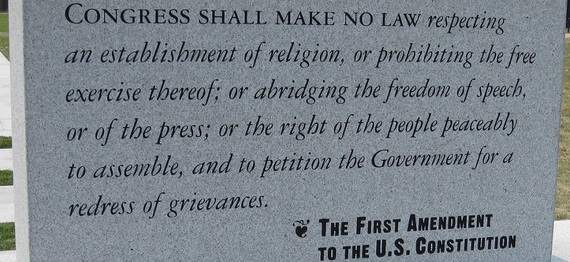Growing up Muslim in America, I learned that there were many rules about speech. At home, I lived with rules based on a hybrid of Islam and polite Hyderabadi Indian culture which forbade me from cursing, and saying "I hate you" or using the word "hate." In the streets, people tolerated cursing, except insulting someone's mother- that was likely to earn you a punch in the face. In some families, children could say "I hate you" to each other, but not to parents. Each family, each person, each culture has its own rules about speech, reflecting the balance of values such as independence, cohesion, and respect. In my own family, the balance favored family cohesion.
On the other hand, public speech rules in America tend to favor individualism. America's founders sought a vibrant and cohesive democracy that prized each citizen's opinion on weighty issues of the day. They wanted citizens to have the right to dissent from government, think independently, and be free of coercion. Differences of opinion were central to good governance. Even if people held passionate convictions, our founders expected that citizens would ultimately reason and debate their positions on issues. Their commitment to these ideals went beyond "rules of speech" and became enshrined as law in our Constitution's First Amendment.
Yet throughout our nation's history, Americans' commitment to free speech has not been absolute. Even though the Constitution legally protects "hate speech," in practice, Americans have pushed to the margins those who practice it. A growing awareness of our pluralistic society has led to less tolerance of public insults based on race, gender, religion, and more recently, sexual orientation. These limits go beyond a matter of political correctness or offense. History shows us that unchecked expression of hatred and its institutionalization disrupt peaceful co-existence and lead to violence and bloody wars, including examples such the Holocaust and the Rwandan genocide. Speech that disregards a person's humanity or a group's dignity is ultimately an obstacle to reasoned debate, since high emotional arousal clouds the brain's ability to think clearly. The responsible exercise of our speech rights is actually what makes civility possible, and this civility is crucial for democracy to flourish.
Some believe that Islam is diametrically opposed to free speech, based on how a small group of Muslims react angrily and violently to cartoons of Prophet Muhammad. But we would perhaps draw different conclusions if we considered free speech hand in hand with our own commitment to civility. In many Muslim societies and families, Muslims are taught that our love for Prophet Muhammad should be greater than our love for family and ourselves, and that loving the Prophet is the way we learn how to be a good Muslim. This devotion makes mockery of the Prophet not equal to but worse than insulting one's mother. Satirical cartoons are also filtered through a mindset of post-colonial resistance to oppression. As such, they ignite a simmering anger, not at free speech, but at perceived American and European hegemony.
If we want Muslim societies to adopt democratic commitments to free speech, we must advocate and be role models of both free speech and civility, understanding that democracy requires both. Ultimately, we cannot advocate for free speech at the price of civility. If what is free speech to us is interpreted as hateful and uncivil to many Muslims in other parts of the world, we will be unable to effectively communicate the merits of free speech.
Building bridges with Muslims and paving the way for democracy will be easier when we leverage the similarity between Islam's speech rules and America's. The first word revealed to Prophet Muhammad is a command to "read," which affirms the importance of reasoning and critical thought. The Quran instructs followers that diversity is created by God, in order that we learn from one another. "Shura" or mutual consultation, is a Quranic commandment, in both private and public realms, consistent with democratic practice. Classical Muslim theologians and jurists differed on many subjects, including rituals, family law, and criminal law. They developed an etiquette of agreeing to disagree, including the explicit admission that one's opinion was simply an opinion and that true knowledge lies with God. These principles and practices support plurality of thought and free speech. They also provide a foundation for respectful debate about Islam and Muslims' practice of their faith.
Looking back at my own upbringing as a Muslim and an American, I appreciate that at home, I was taught to express dislike rather than hate. I also am grateful to know that in America, I have a legal right to speak freely. My prayer for America and for Muslims around the world is that our free speech helps build a public square that reverberates with civility, in the service of democracy, and in the way that God expects of us, by virtue of having created us different.
